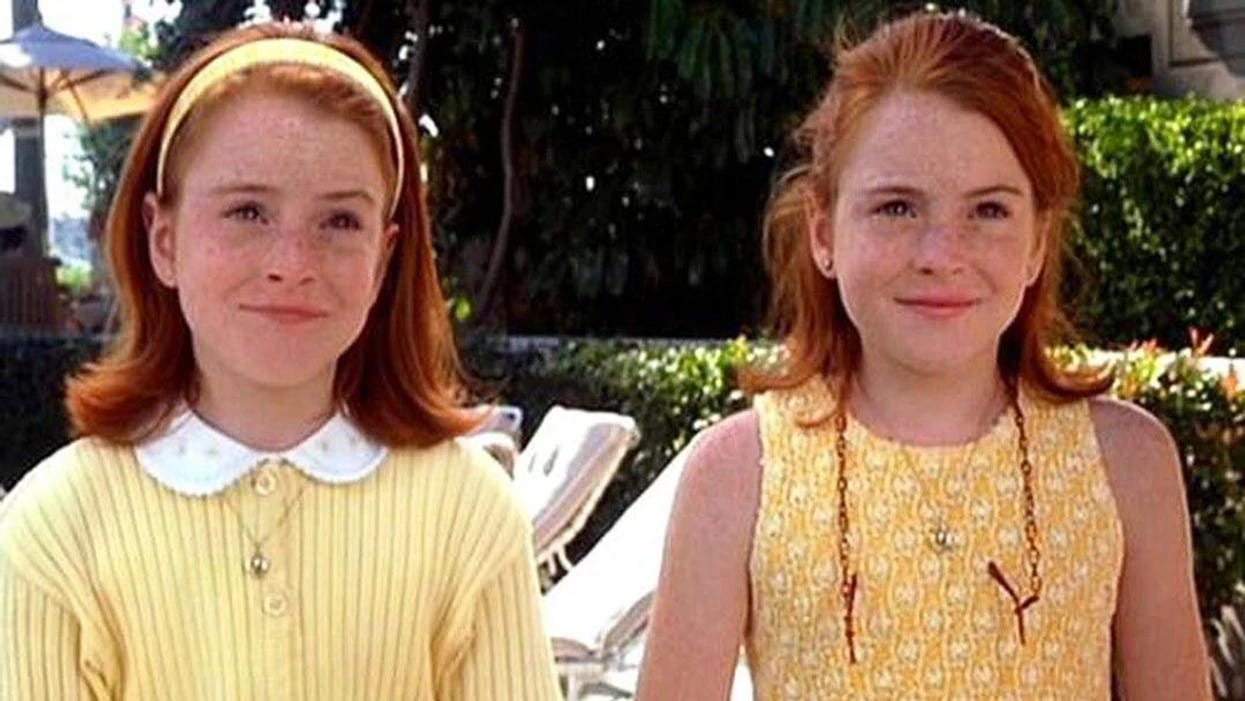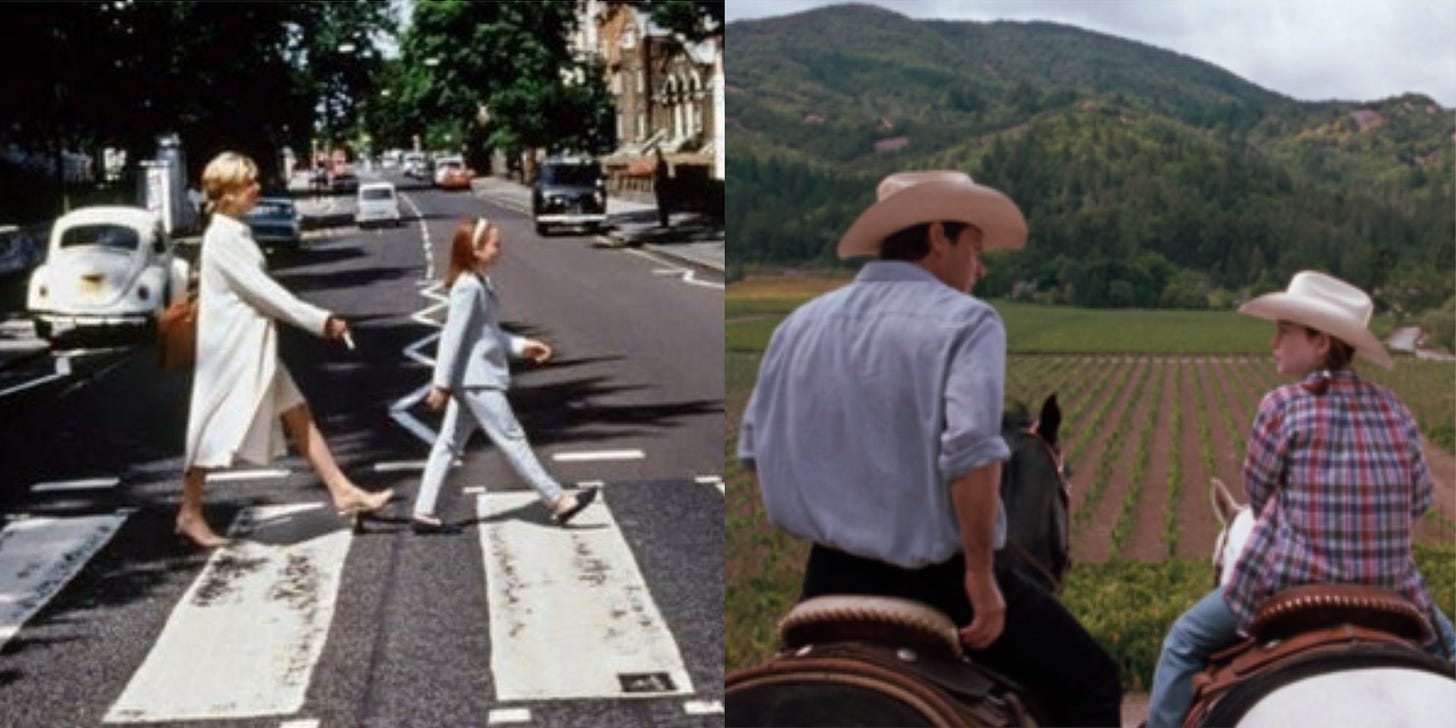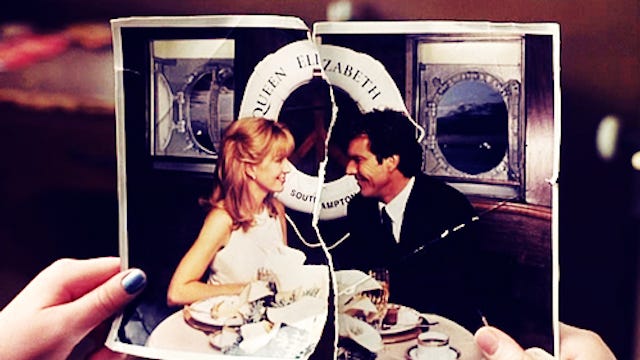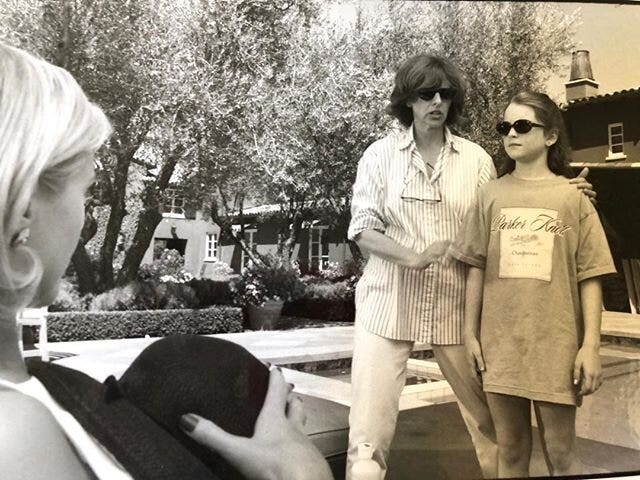My choice for this week’s summer film was inspired by a current cultural phenomenon we’re living through: the Lohanaissance. It all started when Falling for Christmas premiered on Netflix on November 10th, 2022, with Lindsay Lohan as its lead. Then, this Saint Patrick’s Day weekend, Lindsay starred in Netflix’s Irish Wish, which quickly rose to the number one movie on the streaming publication.
Just last week, Disney shared a photo of Lindsay on set with Jamie Lee Curtis, announcing that Freaky Friday 2 is officially in production. My own connection with Lindsay is linked to growing up only a town over from where she and her family lived. My sister once hung out with her brother at a Bat Mitzvah (very long island-coded!), and people in school would claim to have seen her out and about, like at the grocery store or the gas station. She was kind of like Big Foot for my hometown. There was always some claim that she was lurking around the neighborhood, though there was never really much evidence.
Lindsay was in so many of our favorite movies growing up–Freaky Friday, Confessions of a Teenage Drama Queen, and Mean Girls, to name a few. Then she fell victim to a pretty tumultuous young adult life, which isn’t unusual for child stars who spent their most formative years in the spotlight. A lot of child star’s lives end in tragedy, and I believe the excitement regarding the Lohanaissance is rooted in our happiness that Lindsay got another chance at life. Not only is it inspiring to see Lindsay do a full 180, but it brings those of us who grew up with her joy and relief to know she’s doing alright. Without further ado, let’s get into the film where it all began for Lindsay.
Sisters? Halle, We’re Like Twins
One of my favorite Hollywood conspiracy theories is that Lindsay Lohan had a twin sister who starred with her in The Parent Trap, but she later died. I know Lindsay once publicly addressed this, finding it comical and absurd, but I can’t remember when or where. Turns out, it really was Lindsay playing both roles, but the lack of a real-life twin didn’t take anything away from the film’s message of sisterhood.
Media, whether film, television, or literature, loves a good twin story. It was what fans loved about Pretty Little Liars and rooted for in the TV adaptation for seven years; it’s why we love Mary Kate & Ashley so much or my favorite twins in my life, Ava and Chloé Wiliams😘 (of From My Search Bar and Chloé In Letters. There’s something so lovable about the bond between two sisters who have nearly everything in common. The mischievous aspects appeal to us, too, like Halle and Annie trading places or how they teamed up to ruin Meredith Blake’s camping experience and get their parents back together.
“My God, so I’m not an only child, I’m a twin.”-Halle Parker, The Parent Trap.
Many films have an enemies-to-lovers trope, like Anyone But You or Clueless; others, like 13 Going on 30, follow the best friends-to-lovers trope. The Parent Trap steered away from both and constructed its story around an enemies-to-best-friends basis. While it was fun watching Annie and Halle fight and prank each other, it was so much more satisfying to see them come together. There are many aspects that bring the twins together, like being punished for their prank war and having to keep each other company in the isolation cabin, Annie’s introduction to Leonardo DiCaprio, realizing they both like to eat Oreos and peanut butter even though everyone else they know thinks it’s gross and of course, realizing they share the same birthday and the same parents.
What I especially loved was when Halle had to cut Annie’s hair and pierce her ears to make sure they looked identical before switching places. These are both stereotypical girl things, and director Nancy Meyers treated these scenes as such. I remember the nerves every time I got my hair cut as a kid that the hairdresser might mess up or cut it too short. I also remember the panic and anticipation of pain when getting my ears pierced. Annie looks as though she’s being tortured throughout the whole sequence, but despite her fears, she trusts her sister, and Halle doesn’t let her down.
But more than anything else, Halle and Annie bond over growing up with crucial figures missing from their lives. Elizabeth James and Nick Parker were excellent parents to each child, but even though each twin loves and appreciates the parent they grew up with, that doesn’t mean they weren’t curious about what it would be like to know their other parent. Naturally, each twin always felt like something was missing, and while their friends who knew both of their parents wouldn’t understand, Halle and Annie understood each other.
London Mom VS Napa Valley Dad
A common question when it comes to The Parent Trap is where and with whom would you rather grow up, London with Elizabeth or Napa Valley with Nick? It’s a difficult question because both places look so appealing, though I think Napa Valley looks a lot more fun for the summer. Halle and Annie live in vastly different realities when they’re not at camp together, and each upbringing has shaped their personalities.
Halle is way more laid back and rebellious; after all, it’s Halle who proposes the plan to switch places, and Annie is a prim and proper Londoner who is so poised she’d fit right in with the royals. When we see them with their parents for the first time, we understand why they’re like this; they each inherited these qualities from the parents they grew up with.
One of my favorite moments from The Parent Trap is when Elizabeth is called to a photo shoot for her wedding dress brand, and she brings Annie (who is actually Halle) along with her. The two bond at the photoshoot and it’s like watching a little girl play dress up with her mother. Halle even gets into some of the photos toward the end. What I appreciate about Elizabeth is that she doesn’t get annoyed at her daughter for acting unprofessional, but she embraces it and allows her to have fun with the model.
I admire Elizabeth for having such an incredible work and home life balance in the film. I know that’s easier said than done, but by simply inviting her daughter into her career instead of shutting her out and acting like it’s grown-up stuff, she makes it a lot easier for herself, and it allows her to have a healthy relationship with her daughter. Meanwhile, over 5,000 miles away in Napa Valley, Annie is meeting her father for the first time, and it’s a vastly different experience. She’s riding shotgun in her father’s Jeep Wrangler, and she can’t stop saying dad at the end of every sentence, which Nick promptly calls out. It’s evident Annie can’t control her excitement now that she’s finally meeting her father.
“If you ask me, a dad is an irreplaceable person in a girl’s life.”-Annie James, The Parent Trap.
What I find fascinating in The Parent Trap is Elizabeth is portrayed as this goddess-like character, comparable to Princess Diana–many of my generation can agree we confused the two for several years. On the other hand, Nick is not so god-like. In fact, he’s kind of an idiot. He’s not a terrible dad, he’s not a deadbeat or overly neglectful, but he’s a little too preoccupied with a 26-year-old woman who he’s prepared to marry despite having no romantic relationship with her just eight weeks earlier when Halle went off to camp.
At some points, it even feels like Annie is bonding a lot more with Chessy, the family nanny, than with her own father. It’s Chessy who notices that something is off with Halle, and ultimately, she makes the discovery that it’s really Annie in disguise. It takes Nick quite some time to figure out the truth that Chessy seems to instinctively know before Annie finally owns up to the truth. This kind of puts a damper on the situation in which Annie finally gets to bond with her dad for the first time in nearly 12 years. Luckily, she doesn’t seem to care too much, and since it all works out in the end, I guess it doesn’t matter so much after all.
A Love Story Aboard The Queen Elizabeth II
The end goal of the film, expressed in its title, is not just for Halle and Annie to meet eachother, but for them to reunite their parents. The film’s plot feels like a nod toward the idea that the universe works in mysterious ways. Suppose Elizabeth and Nick were somehow destined to be together, even though they’ve spent over a decade apart. In that case, Halle and Annie running into each other at the same camp despite living 5,000 miles away from each other is just a bridge of incidents that took place in order for Elizabeth and Nick to find each other again.
Meredith Blake is just one obstacle standing in the way of the parents reconciling. Again, Nick is somehow not smart or aware enough to realize his girlfriend is bullying his kid daughter, who Meredith is 15 years older than. Making Meredith significantly younger than Nick, labeling her a gold digger, and then making her genuinely mean made it possible for us to root for Nick and Elizabeth’s reunion and see them as more compatible. Had Nick been with someone age-appropriate, who actually loved him, and who was kind to him and his daughter, say someone like Chessy, we might have felt bad about splitting them up.
The unfolding process of Nick and Elizabeth’s reunion doesn’t happen all at once. There isn’t one moment where they see each other again and just know they want to make things work this time. They’re finally reunited when Halle and Annie scheme to bring them together, but Nick is still set on marrying Meredith. After Halle and Annie recreate their first date for them, and Meredith’s terrible experience on the camping trip with Nick, Halle, and Annie brings out her true colors, Nick realizes that he has a much more pleasant time with Elizabeth.
“I made the mistake of not coming after you once, Lizzie. I’m not gonna do that again, no matter how brave you are,”-Nick Parker.
Still, the years that have passed, their living situations, and reality as a whole set in, and even Halle and Annie start to give up on their plan. It’s not until Nick proves how serious he is about uniting the family and getting back with Elizabeth by flying to London with Halle making sure he doesn’t let her slip away a second time. I like the way the film drags their reunion out a bit because it makes sense that neither parent was willing to drop everything for something that didn’t work out the first time, but it also gives us hope and encouragement that some things, love or other aspects of life, are worth fighting for even if it initially looks like it isn’t going to work out.
Nancy Meyers
I would put Nancy Meyers in the same category as Garry Marshall. They both created some of the most iconic feel-good films that have touched generations. Fun Fact: In the original The Parent Trap from 1961, the twins were named Sharon and Susan, but they were renamed Halle and Annie in the 1998 film after Nancy Meyers' real-life daughters. Meyers handled the characters as if they really were her real-life daughters, with the same love and loyalty. One particularly emotional scene comes when Halle is on her way to London via plane. She sits in her seat, praying that her mother will like her.
This intimate scene is set up by Meyers with great respect for the character. We feel a deep sense of sadness for Hallie, who grew up without a mother and is now worried that her mother might reject her. However, Meyers also manages to instill a sense of hope. We hope that Hallie's plan succeeds and that she finally gets to bond with her mother and have a real relationship with her. Halle's prayers are answered in the scene when Elizabeth finds out the truth. Instead of being upset, she tells her she's loved her whole life, a moment that fills us with hope for their future relationship.
I also adore Halle and Elizabeth's first meeting. Halle's mother is standing at the top of the staircase like a queen as Halle runs to and tightly embraces her with tears streaming down her face. Meyers has a way of bringing great emotion to even the simplest moments in the film. She understands what the girls are going through, and although The Parent Trap is a light-hearted film, it does deal with a heavy topic. I love that amongst the silliness, Meyers takes the storyline very seriously. It is a big deal that Halle and Annie grew up with only one parent, and it is a big deal that they are finally meeting the parent they never knew. Nancy Meyers treats it as so, and I am forever grateful for that because The Parent Trap truly wouldn't have been the same in anyone else's hands.








why am i crying while reading this? 🤎☁️